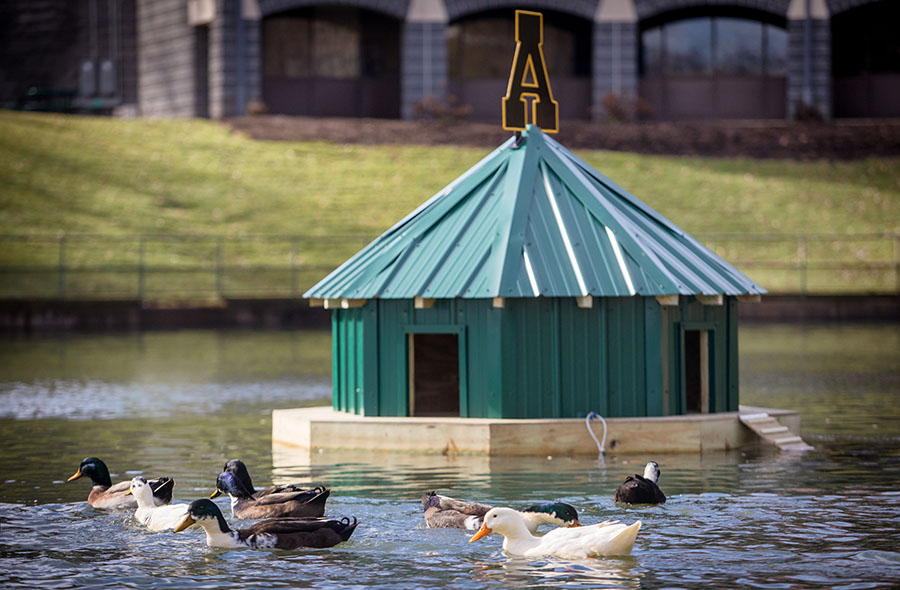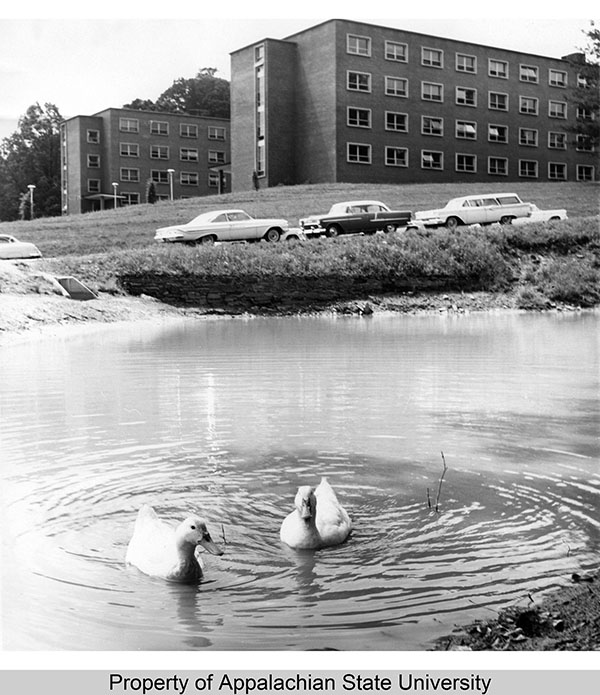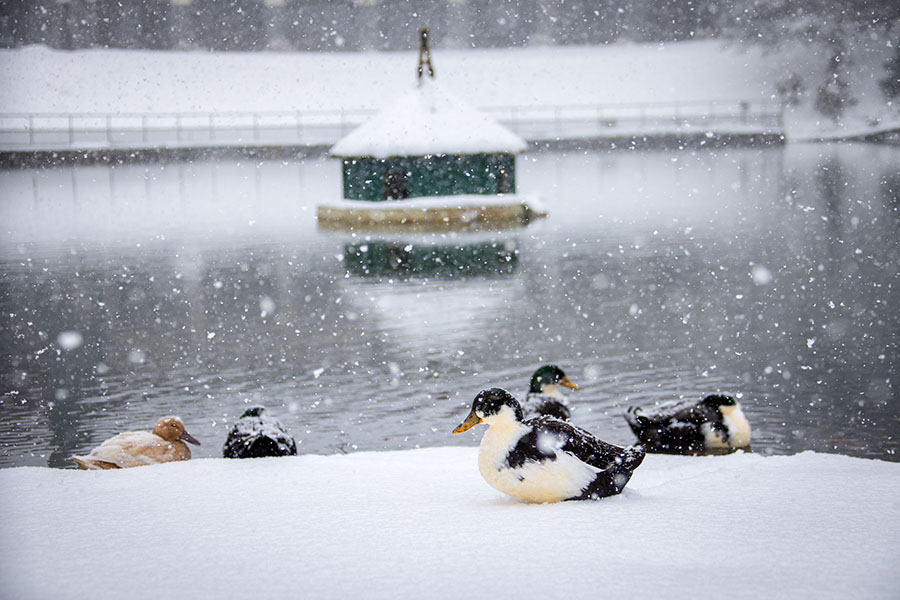BOONE, N.C. — Campus ducks have new digs at the Appalachian State University Duck Pond. A 64-square-foot floating shelter was installed Monday to provide the ducks a safe nesting area and refuge from stormy weather.
The duck pond, located near the corner of Rivers Street and Stadium Drive, has been a landmark on campus since it was installed in 1927, according to the Appalachian historical timeline. For decades, students and visitors have enjoyed watching and feeding the ducks.
Each year, particularly when the weather turns cold and snowy, the Office of the Chancellor receives emails and calls with inquiries about the welfare of the ducks. Some express concern over the safety of the birds in cold weather. Others ask if the ducks’ wings have been clipped so they’ll stay on campus, preventing migration that might naturally occur when the pond freezes over.
Dr. Lynn Siefferman, an ornithologist and associate professor in Appalachian’s Department of Biology, said the campus ducks are mallards, domestic Muscovy ducks and hybrids — all breeds that can withstand very cold temperatures. The ducks have very thick down under their top feathers, making the birds well suited for Boone’s winter climate.
“The ducks’ wings are not clipped, and the birds are free to fly or migrate as they wish,” Siefferman said. “Although mallards often migrate, many mallards overwinter in the southeastern state.”
Siefferman explained much of the campus duck population is probably feral domestic stock, so they do not migrate in the traditional sense. Also, some of the mallards might be visitors — those that breed farther north and spend the winter in Boone.
The mallard is omnivorous and very flexible in its choice of food, so Siefferman said feeding them is neither necessary nor harmful.
In response to concerns expressed by well-meaning bird lovers, Siefferman consulted with other ornithologists about the construction of a shelter for the ducks. It was agreed that while the ducks don’t need a house, it would not be a detriment to their natural way of life to have one.
Wayne Hicks, carpentry supervisor for Appalachian’s Physical Plant, was commissioned to design and build the duck shelter.
“I looked on the internet to come up with a design that would work best for us,” he said. “The house floats to keep the ducks safe from predators — mainly dogs that are loose and raccoons.”
The duck house is constructed of pressure treated wood and painted metal and is “as maintenance free as it can be,” Hicks said.
About the Department of Biology
The Department of Biology is a community of teacher-scholars, with faculty representing the full breadth of biological specializations — from molecular genetics to landscape/ecosystem ecology. The department seeks to produce graduates with sound scientific knowledge, the skills to create new knowledge, and the excitement and appreciation of scientific discovery. Learn more at https://biology.appstate.edu.
About the College of Arts and Sciences
The College of Arts and Sciences (CAS) at Appalachian State University is home to 17 academic departments, two centers and one residential college. These units span the humanities and the social, mathematical and natural sciences. CAS aims to develop a distinctive identity built upon our university's strengths, traditions and locations. The college’s values lie not only in service to the university and local community, but through inspiring, training, educating and sustaining the development of its students as global citizens. More than 6,800 student majors are enrolled in the college. As the college is also largely responsible for implementing App State’s general education curriculum, it is heavily involved in the education of all students at the university, including those pursuing majors in other colleges. Learn more at https://cas.appstate.edu.
About Appalachian’s Facilities Operations
Facilities Operations at Appalachian State University manages operations of campus buildings, systems and utilities, as well as water treatment and steam plants that serve the campus. Services provided by Facilities Operations include housekeeping, landscaping, moving furniture and other items, and managing motor pool fleet rentals. The campus unit employees over 275 skilled technicians — including engineers, locksmiths, electricians, painters, plumbers, carpenters, roofers, welders, controls programmers, housekeepers, landscapers, mechanics and HVAC technicians. Learn more at https://facilitiesoperations.appstate.edu.
About Appalachian State University
As a premier public institution, Appalachian State University prepares students to lead purposeful lives. App State is one of 17 campuses in the University of North Carolina System, with a national reputation for innovative teaching and opening access to a high-quality, cost-effective education. The university enrolls more than 21,000 students, has a low student-to-faculty ratio and offers more than 150 undergraduate and 80 graduate majors at its Boone and Hickory campuses and through App State Online. Learn more at https://www.appstate.edu.
What do you think?
Share your feedback on this story.






![How NCInnovation Is Rethinking Economic Development in North Carolina [faculty featured]](/_images/_posts/2026/02/rethinking-economic-development-600x400.jpg)







